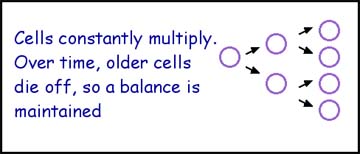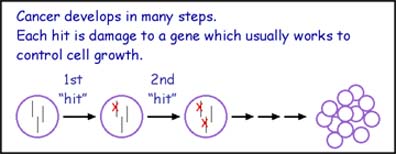Main page
Basic Concepts
Current Issues
in Genetics
How to
Evaluate News
Links
Glossary
Feedback
Cancer Genetics
Cancer is a common disease which is seen most commonly in older people but can also affect young people and children. Most cancers are sporadic, meaning they occur by chance in just one individual.
Our bodies are made up of billions of cells. Cancer is a
disease which happens when cells grow out of control. In our bodies, cells
are constantly growing and dividing. Over time, the older cells die off, so
there is always a balance. In a cancer, cells grow and divide very quickly
without dying off, so that a tumour forms.

Cancer is caused by changes in our genes. The genetic diseases which we usually think about are those in which a changed gene is inherited from one or both parents and is present in every cell of the body. In contrast, most cancer is caused by changes in genes which occur after we are born and occur in only one or a few parts of the body. The development of a cancer usually involves several steps. The first step or "hit" that happens
to a cell is a change in a gene that usually works to control the growth of
cells. The change stops the gene from working properly, so that the cell has
an advantage to grow out of control. If only the first "hit" happens, a
person may never develop cancer. A second "hit" happens when there is damage
to another gene in that same cell. Usually, several "hits" happen before a
cell grows into a cancer.

The cause of the genetic changes or "hits" which lead to cancer is not yet fully understood. Some of the genetic changes happen as a natural part of aging. Others may be due to environmental exposures.
A small proportion of cancers (about 5-10%) occur as part of a cancer predispostion syndrome, in which a person has an increased chance of developing specific types of cancer. Certain signs can suggest that a cancer predisposition syndrome is present. These include multiple people in a family with the same or related types of cancer, multiple cancers in a single person, and cancers occurring at earlier ages than usual.
A person with a cancer predisposition syndrome is born with a change in a gene which usually works to control cell growth. In other words, the first "hit" is already present in every cell of his or her body. A person with a cancer predisposition syndrome has an increased chance of developing one or more cancers, because less additional "hits" are required before cells grow out of control to form a tumour. Not all people with a cancer predisposition syndrome will develop cancer, because the additional "hits" may never occur.
An example of a cancer predisposition syndrome is Hereditary Breast and Ovarian Cancer (HBOC) which is caused by changes in the BRCA1 and BRCA2 genes as well as additional genes which have not yet been discovered. This syndrome accounts for only 5-10% of all cases of breast and ovarian cancer.
Note: Human genetics is an extremely complex topic. This website is meant only as an introduction and overview. If you are concerned about how genetics may affect your health, please consult a health care professional.
URL: http://www.oocities.org/geneinfoPlease send feedback to geneinfo@yahoo.com
Latest revision: © January, 2002 by Julie S. Mak